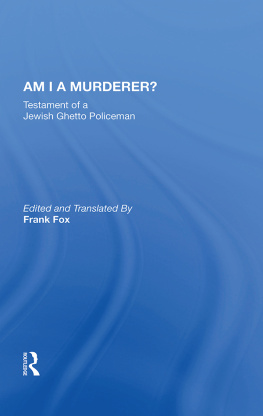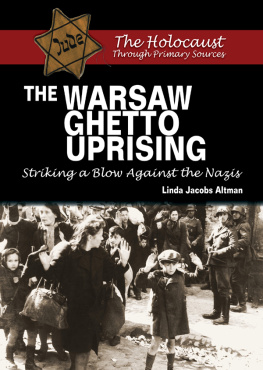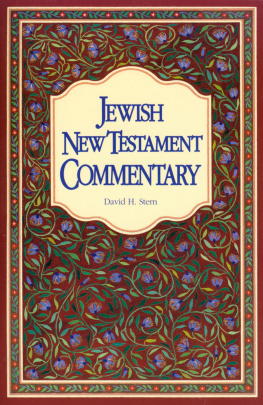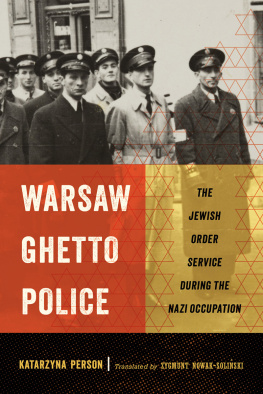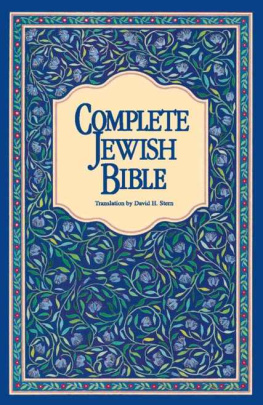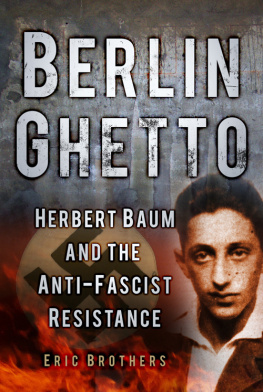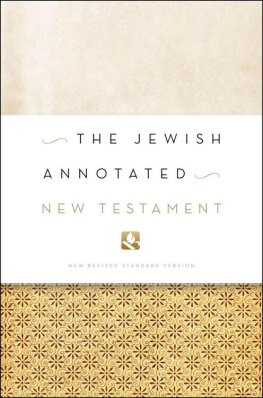First published 1996 by Westview Press
Published 2018 by Routledge
52 Vanderbilt Avenue, New York, NY 10017
2 Park Square, Milton Park, Abingdon, Oxon OX14 4RN
Routledge is an imprint of the Taylor & Francis Group, an informa business
Copyright 1996 by Taylor & Francis
All rights reserved. No part of this book may be reprinted or reproduced or utilised in any form or by any electronic, mechanical, or other means, now known or hereafter invented, including photocopying and recording, or in any information storage or retrieval system, without permission in writing from the publishers.
Notice:
Product or corporate names may be trademarks or registered trademarks, and are used only for identification and explanation without intent to infringe.
Library of Congress Cataloging-in-Publication Data
Perechodnik, Calel, 1916-1944.
[Czy ja jestem morderca? English]
Am I a murderer? : testament of a Jewish ghetto policeman / Calel Perechodnik ; edited and translated by Frank Fox.
p. cm.
ISBN 0-8133-2702-4
1. Perechodnik, Calel, 19161944. 2. Holocaust, Jewish (19391945)PolandOtwockPersonal narratives. 3. World War, 19391945CollaborationistsPolandOtwock. 4. JewsPolandOtwockBiography. 5. Otwock (Poland)Biography. I. Fox, Frank, 1923 . II. Title.
DS135.P63P467613 1996
940.5318092dc20
[B]
95-37124
CIP
ISBN 13: 978-0-367-01017-1 (hbk)
by Frank Fox
Every catastrophe in history is foreshadowed; there are always some signs in the sky warning people about the danger. Rarely does anyone believe them.
Sometimes it seems to me that its a fairy talethe assertion by the medical world that the heart is a chamber of delicate membranes that cannot stand suffering or emotion and that they burst, causing death. Today, I would advise those who construct fighter planes to build them out of heart membranes. They will outlast the most enduring steel.
The greatest skill in this vile world is to be quiet when the heart is bleeding and the fists tighten.
Calel Perechodnik
C ALEL P ERECHODNIK , a twenty-seven-year-old ghetto policeman in Otwock, a town near Warsaw, is witnessing and chronicling not only the end of a people but also the end of a world. Each morning he wakes to a recurring nightmare: An enemy possessed of unimagined hatred occupies his native Poland; only those Jews may live who are still needed to bury others. In February 1941, seeing that the war was not coming to an end and wanting to avoid the labor camps, he joins a force of around one hundred ghetto policemen. Other policemen deliver quotas of Jews, but he claims that he does not have a sporting instinct for rounding up fellow Jews and that his only duty is to deliver bread rations to Jewish officials and their families. Perechodnik hopes the uniform provide a shield for himself, his wife, Anna, and their two-year-old daughter, Athalie. But on the fateful August 19, 1942, Perechodnik and other policemen help herd eight thousand Otwock Jews into the town square, where they are loaded into boxcars. The policemen are promised immunity for their own wives and children, but the German enemy deceives them. Perechodnik watches in horror as his wife and daughter are loaded into wagons headed for the Treblinka death camp.
There is nothing quite like this in the history of confessions. This is not Saint Augustine troubled by his own salvation or Jean-Jacques Rousseau remembering a childhood peccadillo. This is a twentieth-century man bereft of al beliefs, shorn of al human relationships, who begs to be understood even as he confounds us. He refers to his memoir as a fetus, a second child born to his wife and to him. His style is by turns mordant and sentimental, accusatory and self-pitying, sardonic and sorrowful. His mind-numbing purpose is to discover that turn in historys road that took his wife and child to Treblinka. Contradictions abound. He expatiates on his fathers petty absorption with money even as the parent struggles to obtain it for the familys survival. He anathematizes his faith even as he recites the blessings and prayers remembered since childhood. He blasts the perennial Jewish optimism even as he grasps at straws to stay alive.
With the death of the Otwock ghetto, Perechodnik and his mother find a hiding place in Warsaw. Father hides in a nearby village. For the Perechodnik family, as for a handful of other Jews, the remainder of their brief lives will be calculated by dividing the value of their few possessions into days left to live.
Who were these Jewish policemen, young men like Perechodnik, dressed in military-style long coats, leather belts, peaked hats, and high boots and armed with rubber truncheons? My friend, historian Simon Schochet, a survivor of a concentration camp who had the bad fortune to observe the Ghetto Police firsthand, described them in a letter to me as follows:
They were young, in good health, well educated and fluent in Polish. Although treated contemptuously by the Polish intelligencja, they worshipped Western culture and manners and exhibited the worst prejudices and snobbisms of the educated Polish classes. They showed disdain towards Orthodox Jews, felt shamed by their dress, manners and behavior, and blamed them for the ostracism suffered by assimilated Jews such as they. To the best of my knowledge and memory, I have never been told about a Jewish policeman of any ghetto who was a Yeshiva student. The young Orthodox men were not educated in Western fashions, nor were they sports-minded. Their backs were not straight. They were unfit to wear the tragi-comical uniforms of the ghetto police.
Schochets remarks echo what Perechodnik himself writes in his memoir. Finding that Polishness has failed to protect his very life, he turns with vengeance against the Jewishness that stamps him irremediably as an outsider. Time and again he mentions his own Semitic appearance, which makes it impossible for him to escape to the Polish side. When he refers to his fathers good features, he cannot resist a comment on the old mans accented Polish speech. To highlight his own credentials, he quotes lines of classical poetry, uses French expressions and Latin proverbs. As for his beloved wife, she is not well educated.
Schochet did not find any mitigating factors in the short life of Calel Perechodnik:
The Jewish policemen volunteered for the job and separated themselves from the Jewish people. They put on a uniform and wore it for years. They were tools of the killers. The Germans came to Otwock. They brought Utadnians with them to destroy the Jewish community. They enlisted the Jewish policemen to help them in their plan and it was they who blew whistles continuously and led Jews to the waiting trains. Perechodnik was a collaborator in murder. And if he didnt kill people with his own hands, not al the Germans committed murder with their own hands either. Many just stood by and watched. The Jewish policemen had al the food, comforts and women they wanted. Was he guilty of delivering his wife and daughter to the Germans? Certainly he was. What was the difference between Perechodnik and the other policemen? They did not confess. They did not atone. He did.
The Jewish policemen, described in many Holocaust reminiscences as brutal and rapacious (Warsaw ghetto chronicler Emanuel Ringelblum described their cruelty as at times greater than that of the Germans, the Ukrainians and the Latvians


